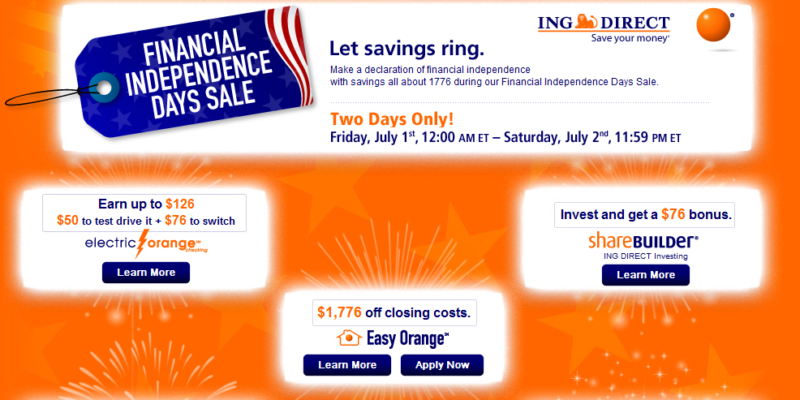Please email me at:
Or use the form below.
[contact-form 1 “Contact form 1”]
The no-pants guide to spending, saving, and thriving in the real world.


I just got an email from INGDirect. To celebrate Independence Day, they are having a sweet, sweet sale.
You can:
Take advantage of all of that and you’ll get $2054 in cash or discounts.
Seriously, this deal rocks. If you don’t have an INGDirect account, get one. There are no overdraft fees and no monthly fees.
The sale ends tomorrow at midnight, so hurry.
When you realize that you’ve buried yourself in debt and decide to get out from under that terrible burden, the first thing you’ve got to do is build a budget because, without that, you’ve got no way to know how much money you have or need. After you’ve got a budget, you’ll start spending according to whatever it says. Hopefully, you’ll stay on budget, but what happens when an emergency does come up? What do you do when your car dies? When you suddenly find out your kids needs vision therapy? How do you manage when your job suddenly gets shipped off to East De Moines?
Your budget isn’t going to help you meet those expenses. Most people don’t have enough money in their bank account to make it all the way to the next payday, let alone enough to keep the lights on and food on the table. How can you possibly hope to deal with even the little things that come up?
You whip out your emergency fund.
The problem with a budget is that it does a poor job of accounting for the unexpected. That’s where an emergency fund comes in. An emergency fund is money that you have set aside in an available-but-not-too-accessible account. Its sole purpose is to give you a line of defense when life rears up and kicks you in the butt. Without an emergency fund, everything that comes unexpectedly is automatically an emergency. With an emergency fund, the things that come up are merely minor setbacks. Without an emergency fund, your budget is nothing but a good intention waiting to get shattered by the next thing that comes along. With an emergency fund, you are managing money. Without it, it’s managing you.
Every “expert” has their own opinion on this. Dave Ramsey recommends $1000 to start. Suze Orman says 8 months. The average time spent looking for work after losing your job is 24.5 weeks(roughly 6 months), so I recommend 7 months of expenses. That’s enough to carry you through an average bout of unemployment and a little more, but that’s not a goal for your first steps toward financial perfection. To start with, get $1000 in a savings account. That’s enough to manage most run-of-the-mill emergencies, without unduly delaying the rest of your debt repayment and savings goals.
Let’s not kid ourselves, $1000 is a lot of money when can barely make it from one check to the next. Unfortunately, this vital first step can’t get ignored. If you really work at it, you should be able to come up with $1000 in a month or so. Here are some ideas on how to manage that:
Dave Ramsey’s advice is to get your fund up to $1000 and then leave it alone until your debt is paid off. Screw that. I’ve got money going into my fund every month. It’s only $25 per month, but over the last two years, it has almost doubled my fund. Don’t dedicate so much money that you can’t meet your other goals, but don’t be afraid to keep some money flowing in .
When can you pull the money out? That is entirely up to you. I have ju st two points to make about withdrawing from your emergency fund:
An emergency fund makes your life easier and your budget possible when the unexpectable happens. Don’t forget to fund yours.
How much money do you keep in your emergency fund? What would it take to get you to spend it?
I’ve been walking though my analytics data. That is the Big Brother software I use to know everything about each one of my dear readers. It’s all part of my master plan to rule the world. Muwahaha!
Some of the results are interesting.
The single most-used search term to find this site is “slow carb diet“, which is great, because I really enjoyed writing that post. I’ve been slacking on the diet lately, but I’m still down more than 30 pounds. I’m currently ranked #3 in Google for this term. If I move up 2 more spots, I’ll outrank Tim Ferriss for his own product. If I aggregated all of the “slow carb” variations, this post probably accounts for more than half of my traffic from Google.
Many of you come here by searching for “how to have a perfect life“. I’ll do everything I can to help you achieve that, but it’s going to take work on your part. There are no shortcuts.
“Beat the Check” is another popular search term, but a very bad game to play. It’s almost impossible to win it, since the Check 21 Act of 2004.
It’s interesting that “trained husband” brings a few of you each month. My question: are you shopping, or exploring a new fetish? Don’t be shy.
I’m a bit amazed that “zombie wheels” is something people actually search for, but 140 people hit Google looking for that term every month, and a few of them make it over here.
“How to stretch a meal“, “things you should buy online“, and “unsecured loan advice” are some of the top personal finance terms bringing you all in, though “how to make a bunker” and its variation are popular, too.
“Hoe can you force your wife” is a bit disturbing. Most of the results are naturally for sex. I can’t help but hope that I’ve either really disappointed this visitor, or convinced him that force is a bad idea.
“How much did a pound of gold weigh in 1854?” is a search that makes me giggle. To the best of my knowledge, the troy scale has been used to weigh gold for a lot longer than that.
That was a fun little stroll through my statistics. Hopefully the fact that I used “fetish” and “sex” in a post will draw more crazy search terms.
How did you find me? Inquiring minds want to know, so please tell me in the comments.
I’ve explained my budget in some detail already. See these posts for the history of this series.
Now, I’m going to go through each section, reviewing ways that I can reduce, or have reduced, my spending. I’ll be starting with my monthly payments.
Occasionally, life goes truly pear-shaped and you’re forced to enter the legal system.
Even if you’re not embroiled in a tawdry, tabloid-fodder divorce, there are still legal issues that everyone needs to address, without exception.
The problem? Or rather, one of many, if you’re having legal problems?
Lawyers are expensive.
Before I go any further:
Where was I? Ah, yes. Lawyers are expensive, but there are ways to mitigate that.
There a couple of things you can handle yourself.
Small claims court, also known as conciliation court. Typical cases in conciliation court include cases involving sums under $7500(varies by state) that involve unpaid debts or wages, claims by tenants to get a security deposit, claims by landlords for property damage, or claims about possession or ownership of property. Fees and procedures vary by state, but generally cost less than $100 to file. The procedures for your state can be found by googling “small claims court” and the name of your state.
Small worker’s compensation cases can be handled yourself, if they don’t involve a demotion or termination related to the injury.
Apartment and car leases are usually simple and straightforward. Read them carefully, but you probably won’t need a lawyer.
You can probably handle your own estate planning and will writing with some decent software. I love Quicken Willmaker. It walked me through a detailed will that takes care of my kids, and gave me advice on financing their futures in the horrible event that I am tragically killed before my wonderousness can fully permeate the world. It also contains forms for promissory notes, bills of sale, health care directives and more. If you have extensive property, I’d still seek an attorney’s advice, but I’d bring the Willmaker will with me to save some time and money.
Purchase agreements. A few years ago, I sold a truck to a friend and accepted payments. I made a promissory note and payment schedule. When he quit paying or calling me, that paperwork was enough to get the state to accept the repossession when I took the truck back.
A simple no-fault divorce is actually pretty painless, on the scale of divorce pain. Again, the procedures vary heavily by state.
Other resources for finding legal information free or cheap include www.legalzoom.com and www.nolo.com.
Have you had to do any of your own legal work? How did it work out?